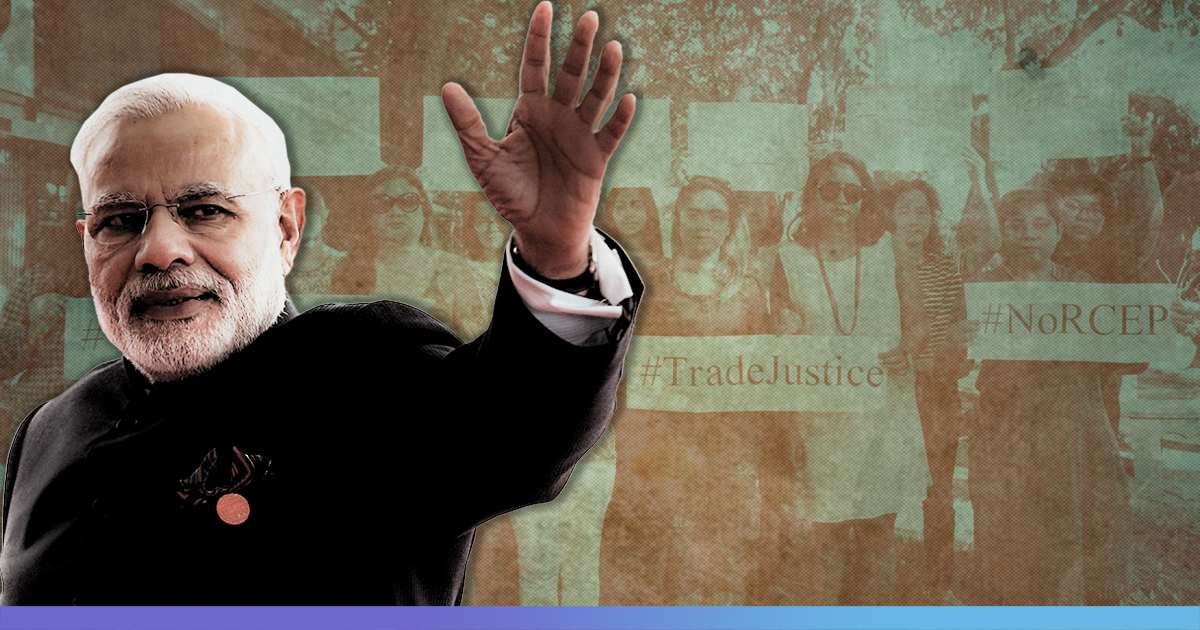India, on November 4, opted out of the Regional Comprehensive Economic Partnership (RCEP). Prime Minister Narendra Modi who was at the RCEP summit in Thailand, said that country’s concerns were not addressed.
“The present form of the RCEP agreement does not fully reflect the basic spirit and the agreed guiding principle of RCEP. It does not address satisfactorily, India’s outstanding issues and concerns. In such a situation, it is not possible for India to join RCEP Agreement “, Modi announced.
He said that his conscience would not have permitted him to sign the trade pact. It was noted that RCEP would have profoundly impacted the government’s economic policy.
He said, “When I measure the RCEP agreement with respect to the interests of all Indians, I do not get a positive answer. Therefore, neither the Talisman of Gandhiji nor my own conscience permits me to join RCEP.”
Indian business and agricultural lobbies had raised worries that the RCEP agreement would flood Indian markets with Chinese products. Indian negotiators at the summit said that Indians had flagged multiple issues related to RCEP, but they were never addressed.
What Is RCEP?
RCEP is a free trade agreement originally comprising of 16 countries across the Asia-Pacific region. The deal looks at low or negligible tariffs and duties between the members to bolster the free flow of goods.
RCEP would have been the largest trading bloc with half the world’s population included in it as it constitutes of 10 ASEAN countries and six FTA (Free Trade Agreement) partners: China, India, Japan, Australia, New Zeland, and South Korea.
China plays a pivotal role in the agreement, as RCEP was China’s idea against the Trans-Pacific Partnership – a free trade agreement devised by the United States.
India’s Concern Over RCEP
With the debilitating economy in the country, agreeing to RCEP might have flooded Indian markets with Chinese products. It would have also taken a toll on BJP’s flagship scheme of ‘Make In India’. The trade between India and China comprises two-third of Chinese exports to India. When it comes to India’s export to China, it mainly comprises of raw material such as cotton yarn and iron ore, which barely adds value to India’s economy.
Apart from this, Indian farmers would have also taken a big hit due to the global giants that would have been given an entry due to RCEP. The milk industry in the country would have stood no chance against New Zeland’s and Australia’s advanced technology.
Opposition’s Reaction
The opposition parties stood against RCEP from its inception. Showing concern over the plummeting economy, Congress president Sonia Gandhi attacked the government for thinking about RCEP. Hence, when PM Modi backed out of the agreement, Congress said their criticism forced BJP to backtrack.
Randeep Singh Surjewala on Twitter said, “BJP Govt had gone overboard in their zeal to sign RCEP completely bartering the interests of farmers, fishermen & MSME’s. As BJP & Amit Shah indulge in fake credit-seeking today, let them remember that Congress’s forceful opposition made them back down.”
BJP Govt had gone overboard in their zeal to sign RCEP completely bartering the interests of farmers,fishermen & MSME’s.
As BJP & Sh. Amit Shah indulge in fake credit seeking today, let them remember that @INCIndia forceful opposition made them back down.https://t.co/si7ouQoVuV
— Randeep Singh Surjewala (@rssurjewala) November 4, 2019
Priyanka Gandhi Vadhra said that BJP was about to walk over farmers’ interest to join RCEP. She thanked the farmers and their families for opposing the agreement.
भाजपा सरकार पूरे गाजे बाजे के साथ रासेप समझौते (किसान सत्यानाश समझौता) के जरिए भारत के किसानों के हित कुचलकर भारत के राष्ट्रीय हित को विदेशी देशों के हवाले करने जा रही थी।
देश के किसानों ने पूरी एकता के साथ इसका विरोध किया #किसानोंकीजीत
— Priyanka Gandhi Vadra (@priyankagandhi) November 4, 2019
Also Read: India And RCEP: Domestic Interests Have Clashed With Trade Negotiations












